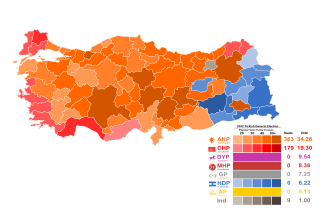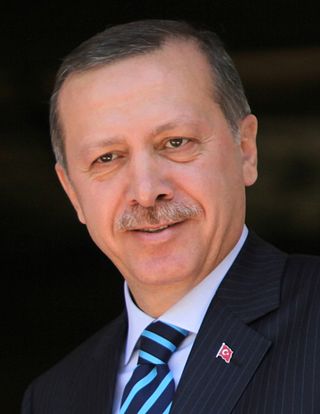First Recep Tayyip Erdoğan cabinet I. Erdoğan Hükümeti | |
|---|---|
| 59th Cabinet of Turkey | |
| 14 March 2003 – 28 August 2007 | |
 | |
| Date formed | 14 March 2003 |
| Date dissolved | 28 August 2007 |
| People and organisations | |
| Head of state | Ahmet Necdet Sezer |
| Head of government | Recep Tayyip Erdoğan |
| No. of ministers | 24 |
| Total no. of members | 26 |
| Member party | Justice and Development Party |
| Status in legislature | 180-seat Single-party majority 365 / 550 |
| Opposition party | Republican People's Party |
| Opposition leader | Deniz Baykal |
| History | |
| Election(s) | 3 November 2002 9 March 2003 (by-election) |
| Legislature term(s) | 22nd |
| Predecessor | Gül |
| Successor | Erdoğan II |
| ||
|---|---|---|
Gallery: Picture, Sound, Video | ||
The first cabinet of Recep Tayyip Erdogan took office on 14 March 2003. He succeeded to the government Gul, who was in office since 18 November 2002.
After the victory of the Justice and Development (AK Party) at the parliamentary elections of 22 July 2007 and the presidential election of Abdullah Gül, who took office on 28 August, on the same day Prime Minister Recep Tayyip Erdogan created a new parliament. Many of the former cabinet members were not carried over.
| Functions | Holder | Start | End | |
|---|---|---|---|---|
| English title | Turkish title | |||
| Prime Minister | Başbakan | Recep Tayyip Erdoğan | 14 March 2003 | 28 August 2007 |
| Deputy Prime Minister | Başbakan Yardımcısı | Abdullah Gül | 14 March 2003 | 28 August 2007 |
| Ministry of Foreign Affairs | Dışişleri Bakanı | |||
| Deputy Prime Minister | Başbakan Yardımcısı | Mehmet Ali Şahin | 14 March 2003 | 28 August 2007 |
| Deputy Prime Minister | Başbakan Yardımcısı | Abdüllatif Şener | 14 March 2003 | 28 August 2007 |
| Minister of State | Devlet Bakanı | Ali Babacan | 14 March 2003 | 28 August 2007 |
| Minister of State | Devlet Bakanı | Nimet Çubukçu | 14 March 2003 | 28 August 2007 |
| Minister of State | Devlet Bakanı | Mehmet Aydın | 14 March 2003 | 28 August 2007 |
| Minister of State | Devlet Bakanı | Kürşad Tüzmen | 14 March 2003 | 28 August 2007 |
| Minister of State | Devlet Bakanı | Beşir Atalay | 14 March 2003 | 28 August 2007 |
| Ministry of Justice | Adalet Bakanı | Cemil Çiçek | 14 March 2003 | 8 May 2007 |
| Fahri Kasırga ¶ | 8 May 2007 | 28 August 2007 | ||
| Ministry of National Defense | Millî Savunma Bakanı | Mehmet Vecdi Gönül | 14 March 2003 | 28 August 2007 |
| Ministry of the Interior | İçişleri Bakanı | Abdülkadir Aksu | 14 March 2003 | 8 May 2007 |
| Osman Güneş ¶ | 8 May 2007 | 28 August 2007 | ||
| Ministry of Finance | Maliye Bakanı | Kemal Unakıtan | 14 March 2003 | 28 August 2007 |
| Ministry of National Education | Millî Eğitim Bakanı | Hüseyin Çelik | 14 March 2003 | 28 August 2007 |
| Ministry of Public Works and Settlement | Bayındırlık ve İskân Bakanı | Faruk Nafız Özak | 14 March 2003 | 28 August 2007 |
| Ministry of Health | Sağlık Bakanı | Recep Akdağ | 14 March 2003 | 28 August 2007 |
| Ministry of Transport and Communication | Ulaştırma Bakanı | Binali Yıldırım | 14 March 2003 | 8 May 2007 |
| İsmet Yılmaz ¶ | 8 May 2007 | 28 August 2007 | ||
| Ministry of Agriculture | Tarım ve Köyişleri Bakanı | Mehmet Mehdi Eker | 14 March 2003 | 28 August 2007 |
| Ministry of Labour and Social Security | Çalışma ve Sosyal Güvenlik Bakanı | Murat Başesgioğlu | 14 March 2003 | 28 August 2007 |
| Ministry of Industry and Commerce | Sanayi ve Ticaret Bakanı | Ali Coşkun | 14 March 2003 | 28 August 2007 |
| Ministry of Energy and Natural Resources | Enerji ve Tabii Kaynaklar Bakanı | Mehmet Hilmi Güler | 14 March 2003 | 28 August 2007 |
| Ministry of Culture and Tourism | Kültür ve Turizm Bakanı | Atilla Koç | 14 March 2003 | 28 August 2007 |
| Ministry of Environment and Forestry | Çevre ve Orman Bakanı | Osman Pepe | 14 March 2003 | 28 August 2007 |
^¶ Nonpartisan minister appointed in accordance with the Article 114 of the constitution in the wake of 2007 elections


















